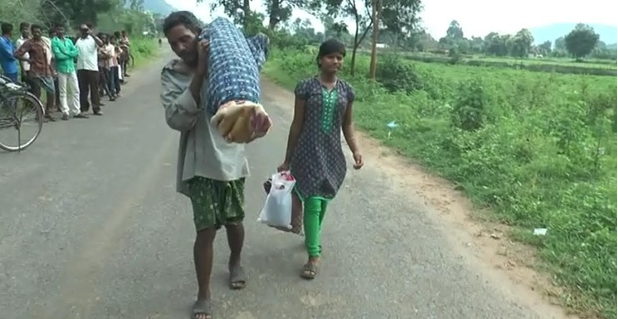Majhi And His Daughter: A Message For India

In a fast developing world, where the neighborhood is seen as a set of people staying next door in a hotel room, the idea of community and caring have become rare thoughts or empty vocabularies in the dictionary of society.
Dana Majhi, a tribal of 42 year old, reinstated this in the courageous march he made for 12kms carrying his wife’s dead body on his shoulders while his daughter followed him behind.
When a society encounters incidents like these, one expects or in fact hopes a different kind of story-telling. If, at one end, the media brought this incident into the limelight, on the other hand, the narratives built around the incident do not reflect adequately on the hopelessness of a lonely man and his daughter who has just lost her mother.
One felt, that the historic courageous march that Dana Majhi made reflects a much stronger message that portrays the values of a woman both as a wife and as a mother in a tribal society.
To put this incident within a framework of governance is like how, political parties play different rule games on different occasions, but get united when it comes to celebrating nationalism. It is in that sense, that I say, that Dana Majhi, today, has become a victim of the nation’s drama that is being unfolded before his eyes every day.
Where was the national guilt in governance mechanisms when a two year old kid was shot dead during the so called anti-naxal operation in Kandhamal recently? Where was the media exposure, when Soni Sori and many other women were raped and tortured by the police officials? Where was everyone when thousands of people were displaced when Vedanta set up their refinery? And today, they share this incident as India’s shame on their Facebook page.
In my view, Dana Majhi’s courageous march towards his home from the municipal government hospital carrying his wife on his shoulders alongside their daughter was a simple rejection of the nation-state that he does not want to belong to... To a democracy he doesn’t want to be a part of... To a development that he neither wants to be a victim of nor a participant to.
To a certain extent, after looking at the pictures and videos of Dana Majhi that were circulated in the social media and electronic media in recent days, one can say that helplessness is not about a situation born out of itself but, it is about the politics of the situation itself.
In fact, one almost understood that as a society, we no longer care or help each other. We, rather make victims of each other in many different ways by putting ourselves into political categories and the governance mechanisms it promises to provide. One can easily make note of this, when one sees the immediacy of celebrations that went around when India won Olympic medals at Rio. In fact, a friend of mine invited me for a dinner celebration, which he hosted, when PV Sindhu won her silver. Nearly a week, has gone past after Dana Majhi’s incident, I am still waiting for a phone call, expecting my friend to call me in order to inquire about or discuss Amangdei’s (Dana’s wife) death.
In, one way or the other, each one of us are just an imitation of what we are criticizing the government and their policies for. Today, one understands that we have changed a lot as a civilization and as a society from being a community and neighborhood to a nation-state that prophesies nationalism.
It is us who are helpless and low with our conscience. But, Dana Majhi with a great integrity took his wife on his shoulders along with his daughter and started marching towards his home, his community and his neighborhood to fulfill her funeral rites. To a great extent, Dana Majhi understood what we all couldn’t – the failure of democracy in a nation-state which treats its genocidal quotient as a governance failure.
This incident in many ways is a metaphoric reflection of what we are no more... We are no more humane, we are no more ethical. If we are no longer humane and ethical, then, we are no longer a democracy of democratic values. Democratic values are about people’s engagement with each other as a collective. With recent emergence of communal tensions, development tragedies and crime, we are fast growing not as a superpower but as a civilization which is showing rising indifference to each other. As a society we have lost our grammars of conscience and are struggling to engage with each other in an everyday sense.
As a society of the future what we need is not a good governance mechanism but rather good civilizational ethics and values than can sustain each other in the web of life. One of the ways to begin with this collective process of engagement is to share stories of indifference like Dana Majhi’s with each other not as a governance failure but as a society’s civilizational failure without being biased and judgmental. We need to be more self-reflective of our thoughts and actions or else we can all forget Dana Majhi’s incident as a governance failure in the everydayness of life and blind our eyes to what’s happening around us.
A mimic
(The author is with KIIT & KISS. Currently, his research focuses on Knowledge studies.)



